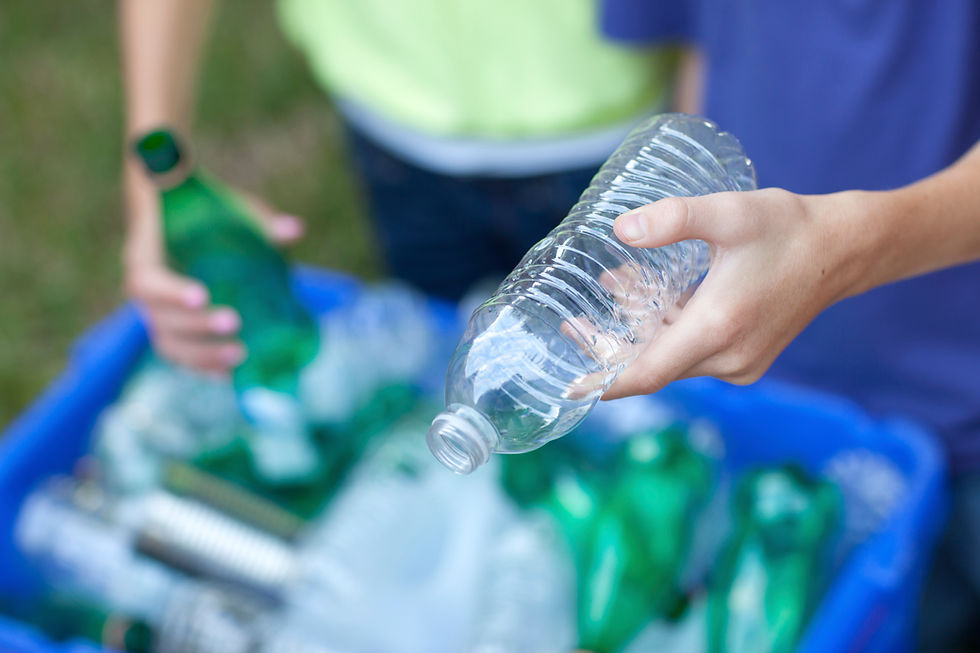Is it necessary for plastic to be clean before recycling?

Yesterday, on my quest to become best friends in earthly health with the business owners in my neighborhood, I met with the proprietor of an incredibly charming coffee shop/flower boutique/calming gift store. (Let's call her Feyre.)
Feyre cares a lot about maintaining an eco-friendly business, but finds it challenging as a busy business owner. Despite having a sizable recycling bin in her shop, customers often dispose of food and other waste in it. Consequently, her already busy staff must sift through the all of the gross trash items to access the recyclable plastics before they can be aside for collection by NYC Sanitation.
Feyre posed an excellent question that I should have known the answer to, but didn't.
"Is it even possible to recycle plastic that is dirty or has been used? I've heard that if the plastic has food or liquids on it, they won't recycle it."
I had to admit to her (and to myself) that I honestly didn't know. So, I promised Feyre (and myself) that I would look into it and provide her with the answer.
The Answer
Q:Does plastic need to be clean in order for it to be recyclable?
A: No, although a rinse can be quite beneficial to the process.
While it is possible to recycle un-rinsed plastics, a simple rinse can significantly improve the chances of the plastic being properly sorted and recycled. Rinsing helps prevent unpleasant odors and contamination from food residues, making the recycling process more appealing and efficient.
According to Recycle Right New York's NYS Recyclopedia the New York Department of sanitation requests the following:
"If a container once held soap, food, liquids, or other residue, clean and dry the container as well as you can before recycling it. Containers should be empty of residue and lightly cleaned, but don’t need to be spotless! Make sure containers are relatively clean to avoid recyclables being sent to landfill."
From what I've gathered so far, the reference to dirty recyclables being sent to landfills essentially suggests that if a piece of recycling is too rank and nasty, someone might be less willing to deal with it.
But wait, there's more...
The problem with film plastic.
We need to talk about film plastic. Recycling film plastics requires extra steps, but apparently it's pretty worth it. These types of plastics can be transformed into composite lumber for decks, benches, and playground sets, or processed into pellets for manufacturing new bags, pallets, containers, crates, and pipes.
Film plastic must be recycled separately from rigid plastic. If film plastic is thrown into a recycling bin designated for rigid plastics, it can get tangled in the sorting machinery at the recycling facility and cause damage and delays. Frequently, the facility needs to be shut down to allow workers to manually remove it.

A large sorting machine at the Materials Innovation and Recycling Authority in Connecticut gets clogged by plastic bags and containers.
(Mark Mirko / Hartford Courant)
Film plastics should not be disposed of in household recycling bins but should be placed in designated film plastics recycling bins (if the material is accepted).
Certain retail stores and most grocery stores in New York State are required to collect film plastics from customers for recycling.
The Plastic Bag Reduction, Reuse and Recycling Law—Article 27, Title 27 of the Environmental Conservation Law (ECL) requires larger retail stores, including
most grocery stores, to make flm plastic collection bins available so consumers can recycle their clean and dry flm plastics. Smaller chain stores with 5 or more locations in New York State and 5,000 square feet of retail space are also subject to the law. Stores are required to make recycling collection bins available to consumers in visible, easily accessible locations.
Film plastic must be CLEAN, DRY, and FREE OF RESIDUE. Additionally, receipts and stickers need to be removed.
Examples of Acceptable Film Plastics
• All-plastic shipping envelopes (labels removed)
• Grocery bags
• Air pillows for shipping (defated)
• Newspaper bags
• Bread bags
• Plastic overwrap from paper products (paper
• Bubble wrap towels, napkins, etc.)
• Cereal liner bags (if it tears like paper, do not include)
• Produce bags
• Dry cleaning bags
• Retail bags with string ties removed
• Furniture and electronic plastic wrap
• Stretch/shrink wrap
• Garment bags
• Zip-top storage bags
Note: Any flm packaging or bag with the “How2Recycle” label indicating
“plastic flm – store drop-of” can be returned to a store’s collection bin.
Examples of Unacceptable Materials
• Degradable/compostable bags
• Polypropylene or “Other” flm or bags
• Bags used for bottle returns
• Rigid food containers
• Bottles
• Salad mix bags
• Chip bags
• Six-pack rings
• Frozen food bags
• Snack/candy wrappers
• Mesh bags
Note: Bags labeled “COMPOSTABLE BAG – DO NOT PLACE IN RECYCLING BIN”
should not be included in a flm plastics collection/recycling bin.
How to Get Involved
Recycle your film plastics regularly. Only recycle clean and dry film plastics.
If your neighborhood store is legally obligated to have a bin but you don't see one, don't Karen out. Simply find a staff member and politely inquire about it. The bins are often positioned inconspicuously due to safety considerations. There may also be a mere misunderstanding about the legal requirements and the store's responsibilities.
Contact the New York State Department of Environmental Conservation (DEC) with any questions by phone at 518-402-8706 or by email at plasticbags@dec.ny.gov.
Visit DEC at https://www.dec.ny.gov/chemical/50058.html

Comentarios